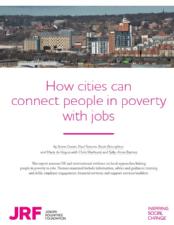IER News & blogs
New article on Policies for Employability in Cities

Duncan Adam, Gaby Atfield and Anne Green have had an article published in the journal Urban Studies on 'what works' in terms of policies for employability in cities. Employability policies targeting urban job seekers have often had a ‘work first’ focus on quick job entries, neglecting sustainability and progression. This article reviews evidence on ‘what works’, drawing generic lessons from research on locally-focused urban policy initiatives in Great Britain operationalised in the context of persistent worklessness in many cities. The findings highlight the importance of employer engagement to open up job opportunities, recognising the diverse needs of individuals, the significance of personalised support for those furthest from the labour market, and co-ordination of local provision. It is argued that providers need to ensure workless groups have the skills and support to access opportunities created by economic growth. Robust local policy analysis remains challenging but important in the context of limited budgets, payment-by-results and a fragmented policy landscape.
Adam, D., Atfield, G. and Green, A.E. (2017) What works? Policies for employability in cities, Urban Studies 54(5), 1162-1177.
How international cities lead inclusive growth agendas
 New research published by the Joseph Rowntree Foundation examines inclusive growth: a major issue in the UK and internationally. To generate ideas to influence UK city leaders research, co-authored by IER's Anne Green and Erika Kispeter, Paul Sissons at Coventry University and Francesca Froy from Whose City Ltd, examined international examples of cities that have developed and implemented agendas and policies to combine economic growth and social inclusion. The research, How international cities lead inclusive growth agendas, highlights that the labour market is a core focus for policy to connect growth and inclusion and points to the importance of paying greater attention to the demand-side of the labour market and minimising the risks of transitions into and within employment.
New research published by the Joseph Rowntree Foundation examines inclusive growth: a major issue in the UK and internationally. To generate ideas to influence UK city leaders research, co-authored by IER's Anne Green and Erika Kispeter, Paul Sissons at Coventry University and Francesca Froy from Whose City Ltd, examined international examples of cities that have developed and implemented agendas and policies to combine economic growth and social inclusion. The research, How international cities lead inclusive growth agendas, highlights that the labour market is a core focus for policy to connect growth and inclusion and points to the importance of paying greater attention to the demand-side of the labour market and minimising the risks of transitions into and within employment.
Knowledge, interchange & collaboration: Anne Green visits South Africa
 In late September, IER's Anne Green travelled to South Africa at the invitation of the Human Sciences Research Council under the auspices of a National Research Foundation Knowledge, Interchange & Collaboration Grant. The purpose of her visit was to exchange knowledge on tackling unemployment issues in the UK, in order to feed into learning on poverty and inequality issues in South Africa. Anne gave a presentation at the Society of South African Geographers Centenary Conference in Stellenbosch and then travelled to Pretoria where she gave a Workshop and a Seminar on unemployment issues and labour market geographies.
In late September, IER's Anne Green travelled to South Africa at the invitation of the Human Sciences Research Council under the auspices of a National Research Foundation Knowledge, Interchange & Collaboration Grant. The purpose of her visit was to exchange knowledge on tackling unemployment issues in the UK, in order to feed into learning on poverty and inequality issues in South Africa. Anne gave a presentation at the Society of South African Geographers Centenary Conference in Stellenbosch and then travelled to Pretoria where she gave a Workshop and a Seminar on unemployment issues and labour market geographies.
Anne Green at 'Better Jobs, Better Business' conference
IER's Anne Green attended and was a speaker in the opening panel session at the 'Better Jobs, Better Business ' national conference in Leeds on 10 March. The conference was hosted by the Joseph Rowntree Foundation in partnership with Leeds City Council, Leeds City Region Enterprise Partnership, the British Hospitality Association, the British Retail Consortium, the UK Commission for Employment and Skills, CIPD and PwC. The event marked the launch of the report 'Improving progression from low-paid jobs at city-region level
' national conference in Leeds on 10 March. The conference was hosted by the Joseph Rowntree Foundation in partnership with Leeds City Council, Leeds City Region Enterprise Partnership, the British Hospitality Association, the British Retail Consortium, the UK Commission for Employment and Skills, CIPD and PwC. The event marked the launch of the report 'Improving progression from low-paid jobs at city-region level ' co-authored by Anne, Paul Sissons and Jenny Ferreria at Coventry University, Kathryn Ray from the Learning and Work Institute and Ceri Hughes from the New Policy Institute.
' co-authored by Anne, Paul Sissons and Jenny Ferreria at Coventry University, Kathryn Ray from the Learning and Work Institute and Ceri Hughes from the New Policy Institute.
New report on How cities can connect people in poverty with jobs
 This study, by Professor Anne Green with others from IER and in partnership with Dr Paul Sissons and Kevin Broughton (Coventry University), reviews UK and international evidence on local approaches linking people not in work to jobs, and those in work to better jobs. It looks at four stages in a stylised ‘pathway to employment’: pre-employment; employment entry; staying in work; and in-work progression. It found that variations in the challenges and opportunities facing cities have an impact on how anti-poverty policies are likely to succeed. Although there are differences in cities’ precise powers and resources, their policies can reduce poverty in their area. However, the evidence is clear that progress can be made without greater local autonomy and with no or limited additional resources. Among other factors in the success of anti-poverty strategies are how strong the local leadership is and what priority is given to change in local areas.
This study, by Professor Anne Green with others from IER and in partnership with Dr Paul Sissons and Kevin Broughton (Coventry University), reviews UK and international evidence on local approaches linking people not in work to jobs, and those in work to better jobs. It looks at four stages in a stylised ‘pathway to employment’: pre-employment; employment entry; staying in work; and in-work progression. It found that variations in the challenges and opportunities facing cities have an impact on how anti-poverty policies are likely to succeed. Although there are differences in cities’ precise powers and resources, their policies can reduce poverty in their area. However, the evidence is clear that progress can be made without greater local autonomy and with no or limited additional resources. Among other factors in the success of anti-poverty strategies are how strong the local leadership is and what priority is given to change in local areas.
For more information see:
Green, A.E., Sissons, P., Broughton, K., and de Hoyos, M. with Warhurst, C. and Barnes, S-A. (2015). How cities can connect people in poverty with jobs. York: Joseph Rowntree Foundation. (A Summary is also available)
